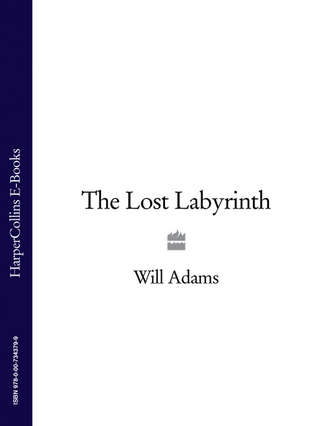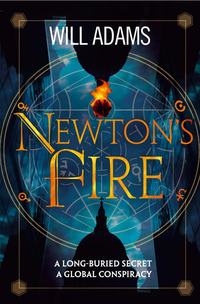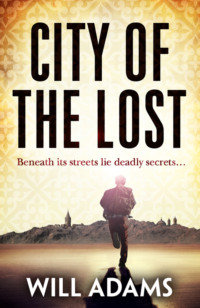
Полная версия
The Lost Labyrinth
FIVE
I
There was one advantage working for the Nergadzes, reflected Edouard, as he and Boris were chauffeured out from Tbilisi International’s Jet Aviation Terminal to the waiting Gulfstream 550. They knew how to look after themselves. The co-pilot welcomed them aboard and escorted them back to the luxurious main lounge, where two more Nergadze toughs were playing cards. Boris introduced them all briskly. Zaal was a short, lithe man with restless, suspicious eyes, as though he’d lived his whole life on the run. Davit, by contrast, was a smiling giant with cauliflower ears and a Zorro nose. There was something distinctly familiar about him too, though Edouard couldn’t work out why.
He hesitated after shaking their hands, expecting to be invited to join their game, as Boris was. But no invitation came, so he shrugged and sank into a white-leather seat across the aisle, stretched out his legs, watched the crew go into departure protocol. They were taxiing almost at once, no nonsense about waiting for other aircraft, before launching into the twilight skies above Tbilisi. He watched through his widescreen window the scattered bonfire of the city gradually going out beneath him, doused by a few thin wisps of cloud. Then lamb cutlets were served on silver plates by a disturbingly androgynous flight attendant, along with vintage champagne in black crystal Fabergé glasses.
His sinuses began to squeeze as they approached Athens, his ears blocking, his eyes watering: he held his nose and blew gently to equalise the pressure until they were safely down. Two immigration officers came out to the plane to process them. His ears were still plugged, he had to lean forwards and frown to make out what they were saying. A pair of Mercedes SUVs with tinted windows were waiting on the tarmac, keys already in the ignition. Boris took a folded sheet of note-paper from his pocket. ‘This is Mikhail Nergadze’s address,’ he told Edouard. ‘We’ll meet you there.’
‘But I don’t know Athens. How will I find it?’
‘The cars have SatNav,’ said Boris. ‘You do know how to use SatNav, I trust.’
‘Yes, of course. But where are you going?’
‘None of your damned business.’
Edouard flushed. It was one thing to be treated rudely by Ilya and Sandro Nergadze, another by their staff. ‘I asked you a perfectly civil question,’ he said. ‘If you can’t answer it in a manner that—’
‘Your mobile and wallet,’ said Boris, holding out his hand.
‘I beg your pardon?’
‘You heard me,’ said Boris. ‘Your mobile and wallet.’
‘But what if I need them?’ protested Edouard.
‘We’re here on a sensitive mission,’ said Boris. ‘Secure communications only. Your mobile isn’t secure, so give it to me.’
‘What about my wallet? Isn’t that secure either?’
‘Please don’t make this harder than it needs to be,’ said Boris. ‘It won’t do you any good.’ He nodded to Davit, who wrapped him in the straitjacket of his arms while Zaal rifled his pockets, pulled out his mobile and wallet, handed them to Boris.
‘What if I break down?’ asked Edouard feebly.
Boris reached into his back pocket for a wad of euros, peeled off two twenties that he stuffed contemptuously in Edouard’s breast pocket. ‘I’ll want them back,’ he said, ‘or a receipt showing how you spent them. Understand?’ He didn’t wait for an answer, just climbed into the back of the first Mercedes, while Davit and Zaal went up front, and then they were gone, leaving Edouard standing there, with only humiliation for company.
II
There was an awkward moment as Knox was being discharged from the police station, when Theofanis tipped up the translucent pouch into which he’d earlier placed Knox’s belongings, so that they all spilled out across the varnished pine counter: his mobile, his wallet, his keys and the little red-leatherette ring box he’d been carrying around these last few days. He glanced at Gaille; she feigned distraction long enough for him to slip it away in his pocket. Then it was down the steps and out the front, wending between parked police cars and bikes.
Night had fallen. The pavements gleamed from a recent shower. A party of students engulfed them for a moment, boisterously shouting out competing plans for the evening. An elderly lottery-ticket salesman lowered his notched stick like a car park barrier across Knox’s chest, promising him a great fortune for a mere five euros. Exotic birds squawked outside a pet shop, while dogs lay listlessly in small cages behind the windows, like so many Amsterdam whores. They reached a silver BMW 5-Series; a lawyer’s car, not an archaeologist’s. Charissa duly unlocked it and took the wheel, her seat moved as far forward as it would go, so that she could reach the pedals. Nico climbed in the passenger side, while Knox opened the back door for Gaille, then got in alongside her, taking and pressing her hand to thank her for being there.
The BMW’s interior was all polished walnut and pale leather, yet it smelled of fast food and there was a colouring book half-hidden beneath the front seat, along with a few discarded sweet-wrappers. The glimpse of family life made Knox warm to Charissa even more than her getting him out of gaol had done. ‘What now?’ he asked.
‘We go see Augustin,’ said Gaille.
‘I’ve spoken to a contact at the prosecutor’s office,’ said Charissa, pulling away. ‘The police have been uncharacteristically active. They must want a quick result very badly. They’ve already reviewed the hotel’s fifth floor CCTV tapes, for example, and established a provisional timeline of movements. May I run it by you?’
‘Of course.’
‘Thank you. A little before two this afternoon, Professor Petitier arrived outside Augustin’s door. He had his laptop over his shoulder and was clutching an overnight bag, and he kept looking around as though he was worried he was being followed. He knocked. The door opened. He held a brief conversation, presumably with Augustin, though he’s out of view, then he disappeared inside and the door closed again. At two-fifteen you showed up and knocked on Augustin’s door, then called out.’
‘I told him we needed to get moving.’
‘Augustin appeared a minute or so later,’ nodded Charissa, looking at Knox via the rear-view mirror. ‘Did he give any sign there was someone inside?’
‘No.’
‘Did you hear or see anything?’
‘No.’
‘You walked together to the lifts. A few guests came and went, but no-one left or entered Augustin’s room until you and Augustin reappeared with Claire and a lot of luggage a few minutes after four. You went inside Augustin’s room. The first two policemen arrived several minutes later. Does that sound accurate?’
‘Pretty much. But if the police know that, how can they suspect Augustin?’
‘They claim he killed Petitier before you left for the airport.’
‘That’s ridiculous!’ protested Knox. ‘He was alive when we came in. He had a convulsion on the floor. He even spoke to us, for Christ’s sake!’
‘Calm down. I’m only telling you the police’s current working hypothesis. They think Augustin assaulted Petitier before you both left for the airport, but that his assault wasn’t immediately fatal, and he was still alive when you returned.’
‘No way,’ protested Knox. ‘No way had Augustin just done that to a man. I’d have noticed in his manner.’
‘You’re his best friend,’ observed Charissa. ‘So you would say that, wouldn’t you?’ She glanced up again, anticipating his indignation. ‘Don’t misunderstand: I’m not telling you what I believe. I’m telling you the case the police are making.’
‘I know.’
‘Shall I continue?’
‘Please.’
‘Okay. A preliminary examination suggests that Petitier was killed by a single blow with some hard, heavy blunt instrument. They found no such implement in the hotel room.’
‘What about Petitier’s laptop?’ asked Knox.
‘No traces of hair or blood on it,’ said Charissa. She grunted with wry amusement. ‘And you won’t believe what they’ve done. Some idiot policeman started it up. When it asked him for a password, he typed in a few wild guesses. The damned thing only started chewing up its data.’
‘Hell!’ snorted Knox. That must have been what Theofanis had told Angelos outside the interview room. ‘How much have they lost?’
‘They don’t know yet. And they may still be able to retrieve it. It’s not like we don’t have computer experts here in Athens. But whether they’ll bother…’ She gave an expressive shrug to suggest that they’d bother if it would serve their purposes, but not otherwise. ‘Anyway, Petitier’s overnight bag was ripped open, and some of its contents appear to be missing, because there’s not enough to have made it look as bulky as it did on the camera. They’re considering the possibility that the murder weapon came originally from Petitier’s case, but that Augustin took it away with him when he left for the airport. CCTV footage apparently shows him carrying a bag. Is that right?’
Knox frowned. It was right. A large cream canvas bag with something bulky inside. ‘What’s that?’ he’d asked. ‘Mind your own business,’ Augustin had retorted. Knox felt a first chill of anxiety. ‘It didn’t look heavy,’ he told Charissa. ‘I mean, nothing to brain a man with.’
‘How do you know that? Did you take it from him?’
‘This is ridiculous!’
‘I’m only asking you what the police will ask. What happened to it?’
Knox sat back, striving to remember. He’d stayed with the car himself, wanting Augustin and Claire to enjoy a private reunion. ‘He took it into the terminal,’ he said.
‘You’re sure?’
Knox nodded. ‘I remember him holding it aside when he met someone coming the other way.’
‘What about when he came back out?’
Knox frowned and shook his head. ‘He had all Claire’s luggage stacked up on a cart. It may have been amongst it, but I can’t remember.’
‘Think,’ urged Charissa.
‘This is preposterous,’ protested Knox. ‘This whole thing is preposterous.’
‘You have to understand something, Mr Knox,’ said Charissa. ‘Last year, our Athens police shot and killed a fifteen-year-old boy. You may remember—we had riots right across Greece. The situation here is still extremely tense. The authorities will be praying that nothing happens to exacerbate it; they’ll be desperate to show that Augustin only got what he deserved. If that means being selective in their investigation, or smearing him or leaking incriminating details to their pet journalists, then that’s what they’ll do. Our job right now is to anticipate every move they might make, and be ready. So I ask again: did he bring this bag back out?’
‘I can’t remember,’ said Knox. ‘But isn’t this all beside the point anyway? I mean, Augustin had no earthly reason to kill Petitier. Aren’t murderers supposed to have a motive?’
It was a rhetorical question; he didn’t expect an answer. So it was something of a shock when Nico half turned in his seat and pulled an apologetic face. ‘Actually,’ he said, ‘I hate to say this, but I’m rather afraid your friend did have a motive after all.’
III
Nikortsminda Castle, Georgia
Kiko Zdanevich had never seen anything quite like it, not outside of school trips and history books, at least. A moonlit fortress of ivy-covered stone with high battlements for its archers and towering pointed turrets from which brave knights-errant like himself could rescue beautiful imprisoned princesses, all set on a small island close to the edge of an ink-black lake, surrounded by ancient forest and snow-capped mountains. He pressed his face against the window as they wound along the country lane toward the island, watched open-mouthed as the drawbridge lowered for them, and the great wooden gates creaked open. ‘Is this really where we’re staying, Mama?’ he asked.
‘I suppose it must be,’ she said sternly, as though offended by his excitement. She’d been in a strange mood ever since Alexei Nergadze and the men in black suits had come for them earlier with a message from their father that they were to spend the weekend with the Nergadzes.
They passed through the outer gates into a vast central courtyard, spotlights illuminating lawns and interior battlements, open flights of stone steps up to them, a chapel with a tall spire and a long line of white-painted stables and garages, not to mention the central keep of grey stone, outside whose front doors they now stopped.
Liveried servants hurried down to collect their luggage from the boot, while Alexei Nergadze led them inside, then down a long and gloomy gallery of stern-faced portraits to a high-stepped spiral staircase. Kiko’s heart swelled briefly at the prospect of sleeping in one of the turret rooms, but they headed along another corridor instead to a rather shabby bedroom with two sagging single beds. ‘The girls will be sleeping in here,’ he said, nodding to them to stay while one of the servants unpacked their luggage.
‘What about me and Kiko?’ asked his mother.
‘You’re further along.’
‘We want to be together.’
‘We have a full house this weekend. This is the best we can do.’
‘Then we’ll all be fine in here, thank you.’
‘Nonsense,’ said Alexei. ‘My grandfather would never forgive me if I didn’t make you all as comfortable as possible.’
‘But I assure you we—’
‘You’re coming with me,’ said Alexei. They followed him and the second servant to another set of stairs. ‘I don’t like this, Mama,’ murmured Kiko. ‘I want to go home.’
She put her hand on his shoulder. ‘Everything’s going to be fine, sweetheart, I promise.’
Alexei showed them next to Kiko’s room. It was grander by far than his sisters’. It had its own fireplace and chairs and desks and tapestries on the wall and huge cream curtains that could be opened and closed by pulling on a rope, and a four-poster bed hung with pink silk decorated with roses. He threw his mother a pleading glance as Alexei led her off to her own room. She gave him just the hint of a wink before she left, asking him to play along for the time being, promising it would be all right.
It was another ten minutes before he heard footsteps outside and then she came back in, carrying her bag. ‘You’re staying with me?’ he asked eagerly.
‘The bed’s big enough, isn’t it?’ she smiled.
‘It’s big enough for a king!’ he cried, climbing up onto it, then jumping up and down.
‘Careful, now,’ she admonished. ‘We don’t want to break anything.’
Kiko nodded and went to the mullioned window, cupped his hands around his eyes, the better to see. Three black limousines with tinted windows were coming in across the drawbridge, their headlights sweeping across the castle’s interior. A canvas canopy had been erected outside the keep’s front steps since they’d arrived, and the cars stopped one by one beneath it. He could hear their doors opening and closing, the cheerful chatter of guests as they made their way inside.
‘What’s got you so riveted?’ asked his mother, putting her hands upon his shoulders, laying a kiss on his crown.
‘People,’ said Kiko. ‘Lots of them.’
‘Wow!’ she said. ‘There are a lot, aren’t there?’
‘What do you think that canopy is for?’ he asked.
‘I suspect it must be to keep all these guests dry from the rain.’
‘But it’s not even raining.’
‘Yes. But they weren’t to know that when they put it up, were they?’
‘I think it’s to stop those cameras in the sky from seeing who they all are,’ declared Kiko, who had a fondness for spy films.
His mother ruffled his hair affectionately. ‘You do have an imagination, don’t you?’ she said, drawing the curtains and leading him away.
‘Yes,’ he smiled. ‘I suppose I must.’
SIX
I
Edouard tapped Mikhail Nergadze’s address into his Mercedes’ SatNav, only to discover that someone had been making mischief, downloading a husky-voiced woman to deliver breathy doubleentendre instructions. ‘After eighty metres, unnh, turn hard left,’ she urged, triggering in Edouard a sudden welcome memory of the one time he’d ever come even close to infidelity, tempted into a seedy Kiev escort bar by boredom and a leather-clad whore in icing-sugar make-up, then having to spend an exorbitant sum on champagne before he could negotiate his escape.
‘Right turn ahead. Get ready. Yes. Yes. Yes. Now!’
He turned her down as low as he could, then lost himself in a brown study, brooding on Nina and the kids, how to help them. Maybe he should get in touch with Tamaz. They weren’t particularly close, but they were still brothers. Tamaz had invited him over for a drink a few weeks before, had introduced him to a man called Viktor, then had left them alone together. Viktor’s pitch had been simple and direct: give him Ilya Nergadze and name his price. Edouard, still believing back then the Nergadzes’ own view of themselves as victims of government propaganda, had stormed angrily away and hadn’t spoken to Tamaz since, but maybe—
‘Left turn, unh, coming up.’
He shook his head. It was madness even to think of it. For all he knew, Viktor was a Nergadze mole, out to test his loyalty. He turned on the radio, punched channels until he found some music to soothe him. He drove for forty minutes, skirting eastern Athens to its northern foothills. The roads grew narrow and quiet. Through gaps in walls and fences, he caught glimpses of expensive villas. He reached a high stone wall topped with broken glass, a row of pines behind, like troops at the battlements. A private drive was flanked by ‘Keep Out’ signs, but the gates were open and his SatNav siren urged him on, so he crunched up the gravelled track to a whitewashed mansion lit by discreetly positioned spotlights, a gold Ferrari parked obliquely outside, its passenger door hanging open, as though someone had been in a hurry to get inside.
Edouard pulled up behind it, then sat there for a while, hoping Boris and the others would arrive. He didn’t fancy going in alone. But the minutes passed and there was no sign of them, so he got out and went to the front door, which was fractionally ajar. A Nino Chkheidze love song was playing inside. A Georgian, then; this had to be the place. He knocked twice, but no one answered. The song set out on its familiar crescendo, came finally to its end. He knocked again before the next song could begin. Still nothing. He went cautiously inside, into a vast open-plan atrium two storeys high, topped by a magnificent glass dome, through which he could just about see the night sky. There was a gleaming white-and-chrome kitchen to his left, a polished mahogany dining table and chairs to his right; and, straight ahead, a semicircle of black leather sofas and armchairs facing a huge plasma TV tuned mutely to the 24-hour news. Marble staircases rose on either side of him to a first-floor landing that girdled the atrium like a belt. Numerous doors led off this landing, presumably to bedrooms and bathrooms.
‘Hello!’ he called out. ‘Anyone here?’ But he could hardly be heard above the music, so he made his way over to the music centre. A glass coffee table was covered with the debris of an impromptu celebration, two empty champagne bottles, some disposable patisserie trays, an overflowing ashtray and an enamel box of white powder that he hurriedly closed and tried to pretend he hadn’t seen. A skirt was lying discarded on the floor, a torn white blouse, white knickers, a blue sport’s bra. He found several remote controls, pressed mute buttons until finally there was silence. ‘Hello!’ he called out again. ‘Anyone home?’
A door opened above and a man appeared on the landing, naked except for a saffron towel tucked around his waist. His torso and arms were lean and muscled like a middleweight boxer, and he had a crude prison tattoo on his right biceps. A Nergadze for sure, Edouard knew, partly from his characteristic broad nose and high forehead, partly from the swagger with which he held himself, but mostly from the calm yet purposeful way he was aiming a sawn-off shotgun down at Edouard’s face.
II
‘What the hell are you talking about?’ demanded Knox angrily. ‘There’s no way on earth Augustin killed Petitier.’
Nico held up a palm. ‘You misunderstand,’ he said. ‘I’m not suggesting he did. All I’m saying is that the police might be able to establish a motive.’ He shifted even further around in his seat, as far as his bulk would allow, squeezed between the door and the hand-brake. ‘Do you know why I offered Petitier the chance to give a talk?’
‘No.’
‘I was originally planning to take that slot myself, but I stood aside for him. I didn’t do that lightly, I assure you. I like to talk.’ He gave a self-deprecating chuckle. ‘It’s one of the reasons I organise these conferences, frankly, because no one else ever invites me. But I had a good reason to stand aside this time. You see, Petitier emailed me six weeks or so ago, demanding I let him address the conference. Very abrasive, very arrogant. I hardly even remembered him, though he used to be quite close to one of my colleagues at the university.’
‘And?’
‘I thanked him for his interest, but told him I’d already filled all the speaking slots. Which was true, of course; these things get finalised months in advance. I said he was welcome to speak at one of our roundtables. He insisted that wasn’t good enough and assured me it would be worth my while, that he had something extraordinary to share with the world. I asked him what; he refused to say. I assumed I’d hear no more. You always get these cranks hanging around conferences, convinced they’ve solved all the riddles of the ancient world. But then a package arrived at my office. A note from Petitier, along with ten Linear A and Linear B seal and seal-stone fragments wrapped in cotton wool. They’re not my specialty at all, so I took photos and emailed them around: because if these fragments were already in the public record, one or other of my colleagues would have been bound to recognise them. But none did. So it looked as though Petitier had at the very least found some new seals, and thus very probably an important new site too.’
‘Even so,’ said Knox. ‘That scarcely merits a platform at a conference like this.’
‘No,’ agreed Nico. ‘But there was something else. It slipped past me, because I’m no language expert. But one of my colleagues picked up on it at once. You see, while none of the Linear A seals were decipherable, two of the Linear B seals were. Or, at least, one word on each of them was.’
‘And?’
‘The first word is “gold” or “golden”.’
‘And the second?’
A somewhat sheepish look spread across Nico’s face. ‘It means “fleece”,’ he said.
SEVEN
I
Edouard raised his hands numbly as Mikhail Nergadze pointed his shotgun down at his face. ‘Please don’t shoot,’ he begged.
‘Give me one good reason.’
‘My name’s Edouard Zdanevich,’ he swallowed. ‘I work for your father. He sent me to—’
‘The antiquities expert.’
‘Yes.’
Mikhail kept his shotgun aimed at Edouard’s face a moment longer, perhaps assessing the story, more likely to emphasise who was in control; but then he lowered it and held it down by his side. ‘I was expecting Boris and some others.’
‘They’ll be here soon. They had an errand to—’
A muffled cry came unexpectedly from the room behind Mikhail. A woman, in obvious fear and distress. Edouard looked up in bewilderment. She cried out again, louder and clearer, as though she’d managed to spit out a gag. She sounded young. ‘Who’s that?’ he asked.









